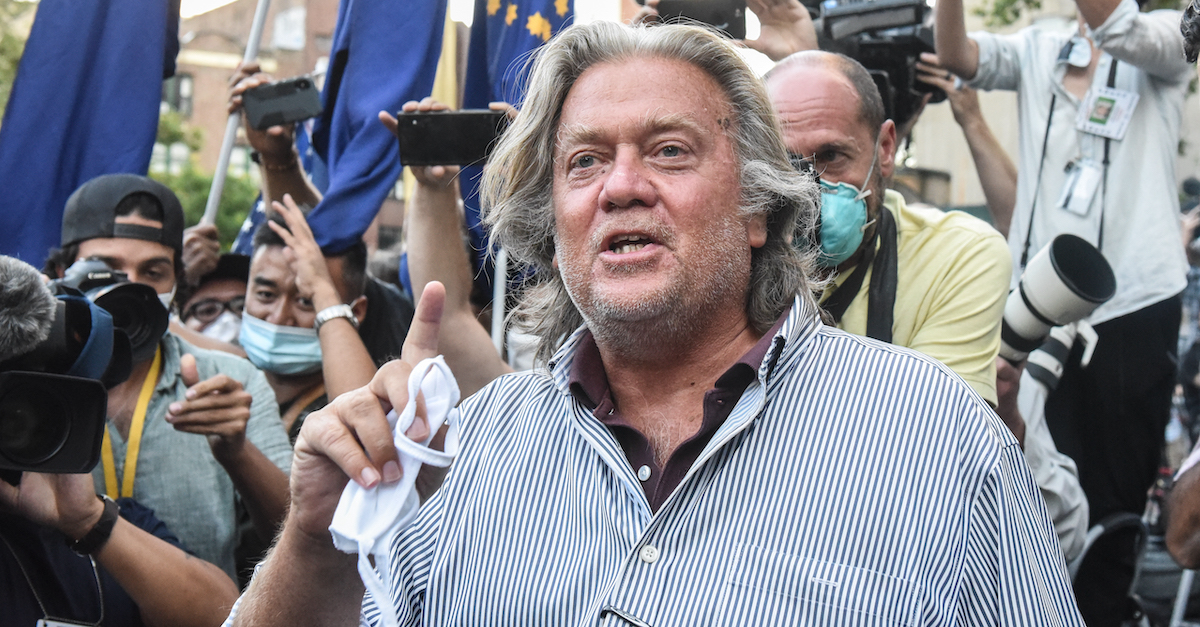
Opposing the prosecution’s surprising effort to close his case without dismissing his indictment, Steve Bannon’s attorney told a judge that his client is not trying to “re-write history” by trying to boot his charges.
“An ‘administrative termination’ which is proposed by the government is inadequate, as it suggests a temporary suspension that might be revived in the future,” Bannon’s attorney Robert Costello wrote in a 16-page memo. “There is no future prosecution under this indictment with a pardon, Mr. Bannon will never be tried in this court on the charges contained in this indictment.”
As first reported by Law&Crime in late February, federal prosecutors announced that they would try to keep Bannon’s indictment on the books even after former President Donald Trump pardoned him, noting that such an act of clemency “involves forgiveness, not forgetfulness.”
The practical effect of preserving the indictment while closing the docket is unclear, leaving some to question whether prosecutors had any intention to re-convene the grand jury that charged him last year.
Jennifer Rodgers, who spent more than a decade as a Southern District of New York prosecutor before becoming a CNN legal analyst, told Law&Crime in an interview for the “Objections” podcast that prosecutors might just want to clarify the law on the reach of the presidential pardon, or they might be clearing the way for other charges that Trump’s pardon does not cover.
“It is possible that they want that indictment to stand so that they don’t have to go back and put in all the evidence against him to charge him with new offenses,” Rodgers told Law&Crime.
Costello, who was identified in the Mueller report as a former “back channel” between Rudy Giuliani and Michael Cohen, became Bannon’s attorney shortly before the ex-Trump strategist received his pardon. He has been accused of dangling a pardon to prevent Cohen from cooperating against Trump, an allegation Costello denies.
Now, Costello is litigating the residual effects of a pardon that his client secured.
“Simply put, there are no established facts that Stephen Bannon is seeking to eradicate, nor could he, if those facts had been established. Stephen Bannon is not seeking to prevent any organization or person from forgetting history,” Costello said. “Anything that is established by a finding of probable cause has been established and dismissing a defendant from an indictment does not eradicate the probable cause finding. We do not understand why the Government is so concerned about a probable cause finding, because it is elemental that a probable cause finding does not overcome the presumption of innocence.”
Costello concedes that he found another Trump-issued pardon case that ended in an administrative closure: the prosecution of Casey Urlacher, the mayor of the tiny, 547-population town of Mettawa. He had been accused of running an offshore gambling ring–along with nine other people including a veteran of the Chicago Police Department.
Judge Emmet Sullivan, who was handling Urlacher’s case, closed it administratively on his own accord, without prosecution or defense input, according to Bannon’s legal team.
“We submit that this determination was the exception to the rule, and as we demonstrate below was, as Judge Emmet Sullivan said in the Flynn case, not the appropriate way to deal with an indictment (or Information) where a pardon was granted prior to trial,” Bannon’s defense memo states.
Before Trump’s pardon, Bannon had been charged with defrauding donors from We Build the Wall, a crowdfunding initiative to build a U.S.-Mexico barrier, and laundering their money. Prosecutors claimed he swiped $1 million from the non-profit. The charity’s founder Brian Kolfage and other officers Andrew Badolato and Timothy Shea received no clemency and continue to await trail.
Read the 16-page memo below:
(Stephanie Keith/Getty Images)
Have a tip we should know? [email protected]